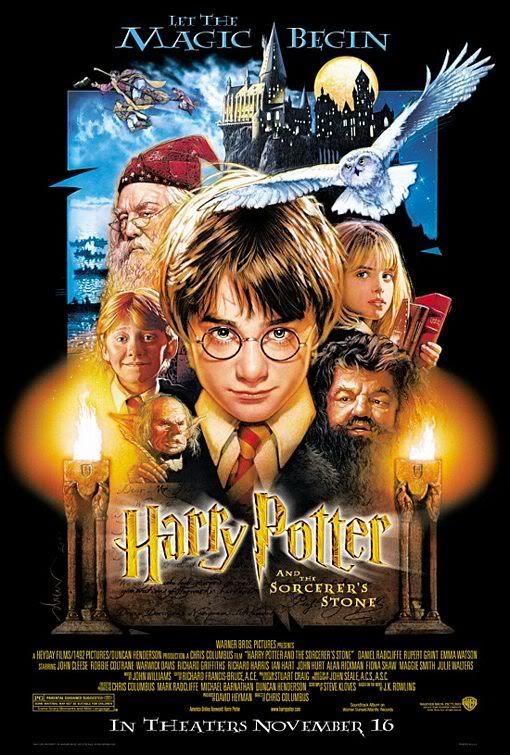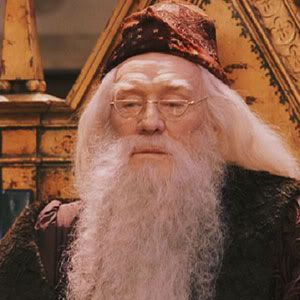

Director: Chris Columbus, 2001.
This is the first of the Harry Potter films from the J.K. Rowling book of the same name. When Rowling penned this first book in 1997 she was a poor single mother. Seven books and five films later, she is a multimillionaire having sold more than 400 million copies. But while the first book was the shortest, this film is longer than two later ones. And this is its shortcoming. It tries too hard to be like the book and feels pedestrian and overly long. Although it is obviously establishing a first chapter in a series, it spends far too much time doing so before getting to the main story of Harry's year one at Hogwart's School for Witchcraft.
Where the books gave us new names like Dumbledore and Voldemort, Hagrid and Snape, the movie gives us faces for these names. Who can now picture Rubeus Hagrid without seeing the towering Robbie Coltrane or Severus Snape without the
 lank-haired Alan Rickman. It also gave us a memorable John Williams score, to go alongside his other famous film compositions of the last 20 years (e.g., Star Wars, Jaws, ET, Raiders of the Lost Ark, and so many more).
lank-haired Alan Rickman. It also gave us a memorable John Williams score, to go alongside his other famous film compositions of the last 20 years (e.g., Star Wars, Jaws, ET, Raiders of the Lost Ark, and so many more).By now most people know the story-line of the Harry Potter series. It is a classic good versus evil plot set among the wizards of England. Harry is the son of James and Lily Potter, who died at the hand of Lord Voldemort (He-Who-Shall-Not-Be-Named). But instead of killing the baby Harry, Voldemort's curse somehow backfired, leaving Harry alive with a pronounced lightning bolt scar on his forehead. To protect him, Professor Dumbledore takes him to his relatives, the dastardly Dursleys, who despise him and treat him worse than a servant. But on his 11th birthday, everything changes. He is old enough to be invited to attend Hogwarts and learn the skills of wizarding.
Harry's life as a second-class citizen with the Dursleys is juxtaposed with his new-found freedom as a famous wizard offspring. And many wizards see him as a symbol of hope, a young savior who will somehow and someday bring them their salvation. As Jesus was recognized as a young baby (Lk. 2:16-38) and again caused a stir in adolescence in the temple (Lk. 2:41-50), so Harry's presence in Diagon Alley and again at Hogwarts brings comparison to our Lord.
This comparison also brings up a controversy that has surrounded the books and films since their release. Harry Potter has caused division in Christian circles. Some have openly opposed them, saying they glorify witchcraft and the occult; such Christians have refused to allow their children to spend time with this entertainment citing scriptural injunction against sorcery (Lev. 19:26). Others see the books and films as escapist fantasy, in the vein of C.S. Lewis' Narnia series, or even J.R.R. Tolkien's classic "Lord of the Rings" trilogy. Although the Harry Potter books are not in the same class as those, they are still simple fantasy with no proselytizing agenda; and they are fun to read or watch. I personally feel that the books are imaginative and do not confuse the intended audience. They depict good and evil and convey a moral message, as well as themes that are supportable biblically, as we will explore below (and in later reviews of the subsequent films).
 As Harry (Daniel Radcliffe) befriends loyal Ron Weasley (Rupert Grint) and studious Hermione Grainger (Emma Watson), he sets the stage for this movie and those to come. This is a trio that will stick together like glue. At the end of the film when Harry compares himself and his cleverness to Hermione's, she responds, "There are more important things: friendship and bravery." These are the themes of this first film, and they will reappear throughout the long series. Much could be said of these themes. They resonate with the human heart. They fill the works of great literature. They show up in the bible. They are true to life, because they are at the heart of life.
As Harry (Daniel Radcliffe) befriends loyal Ron Weasley (Rupert Grint) and studious Hermione Grainger (Emma Watson), he sets the stage for this movie and those to come. This is a trio that will stick together like glue. At the end of the film when Harry compares himself and his cleverness to Hermione's, she responds, "There are more important things: friendship and bravery." These are the themes of this first film, and they will reappear throughout the long series. Much could be said of these themes. They resonate with the human heart. They fill the works of great literature. They show up in the bible. They are true to life, because they are at the heart of life.A key plot-point at the heart of Sorcerer's Stone is that of choice, which shows up in three key scenes. Passively, choice is imposed on Harry twice. First, in Diagon Alley: "The wand chooses the wizard." Harry must accept the wand that chooses him. Second, in the Hogwart's dining room, the Sorting Hat chooses which school house to put him in. Despite the promise of greatness if placed in Slytherin, Harry wants anything but this. He would choose goodness over greatness. These passive choices are much like God's sovereign rule over life. We live in the decrees and plans of God, and like Harry must humbly accept what God brings into our lives. Yet, Harry had also had active choice. He made a clear choice when confronted with a decision on whom to befriend. When Draco Malfoy, arrogant and destined for Slytherin, holds out his hand of friendship to Harry, having just demeaned Ron and Hermione, Harry says "I think I can choose the wrong sort for myself." He again chooses goodness. Poor choices in friends leads to deterioration of character. (This was displayed clearly in Son of Rambow.) God has graced us with free will, and we must choose carefully how we exercise this.
 Another sub-plot centers around the hidden Mirror of Erised. This is no ordinary mirror. A magical mirror, it reflects the desires of the heart not the visage of the viewer. When Harry stumbles upon it, it shows him his dead parents. This ensnares him and captivates his time and attention. Going back time after time, Dumbledore finally catches him and warns him, "It does not do to dwell on dreams, Harry, and forget to live." This is excellent advice. There is a place for dreams, if they inspire us and motivate us for the better. But if we get so wrapped up in the dream, as Harry did, then we stop enjoying the present. We forget to live in the here and now. Dreams are supposed to help, not hinder, our pursuit of life.
Another sub-plot centers around the hidden Mirror of Erised. This is no ordinary mirror. A magical mirror, it reflects the desires of the heart not the visage of the viewer. When Harry stumbles upon it, it shows him his dead parents. This ensnares him and captivates his time and attention. Going back time after time, Dumbledore finally catches him and warns him, "It does not do to dwell on dreams, Harry, and forget to live." This is excellent advice. There is a place for dreams, if they inspire us and motivate us for the better. But if we get so wrapped up in the dream, as Harry did, then we stop enjoying the present. We forget to live in the here and now. Dreams are supposed to help, not hinder, our pursuit of life.After much time spent introducing the school, its features like moving staircases and moving artwork, its professors and staff, the film moves to its main plot. This involves the sorcerer's stone (called the philosopher's stone everywhere except in the US), which is a magical stone that can imbue immortality. Protected by Fluffy, the giant three-headed dog, the fearsome threesome pursue this before it falls into the wrong hands. On the way, there is the most lively chess game on film, wizard's chess.
 As Sorcerer's Stone draws to its climax, Harry faces his foe, and is told: "There is no good and evil, there is only power, and those too weak to seek it." Here is the philosophy of "might makes right." It is the immorality of power, and it is a lie, both in the movie as well as in the Bible. As Satan lied to Adam and Eve in the garden (Gen. 3:1-5), so he continues to lie today (Jn. 8:44). There absolutely is good and evil. The first act of the Bible is the story of a good creation that is marred and twisted by evil; the rest of the story is that of the ultimate redemption and restoration of this creation by a good God and his ultimate triumph of good over evil. Yet, even today we live in the midst of this story, seeing the impact of evil on our world, even on our own lives and in our own characters. Yet we see glimmers of the goodness of God in acts of grace and mercy, in lives touched by his hand. So, we know innately that there is good and there is evil. Having power does not negate good and evil. Power itself is amoral, but when combined with the innate sinfulness of humanity it works its "magic." As Baron Act famously said, "Power tends to corrupt, and absolute power corrupts absolutely." Yet, Jesus had absolute power. He humbled himself to take on frail flesh (Phil. 2:6-8), and today his power is made perfect in his followers in their weakness, not their strength (2 Cor. 12:9). There is good and evil and only in weakness will Jesus-followers find power.
As Sorcerer's Stone draws to its climax, Harry faces his foe, and is told: "There is no good and evil, there is only power, and those too weak to seek it." Here is the philosophy of "might makes right." It is the immorality of power, and it is a lie, both in the movie as well as in the Bible. As Satan lied to Adam and Eve in the garden (Gen. 3:1-5), so he continues to lie today (Jn. 8:44). There absolutely is good and evil. The first act of the Bible is the story of a good creation that is marred and twisted by evil; the rest of the story is that of the ultimate redemption and restoration of this creation by a good God and his ultimate triumph of good over evil. Yet, even today we live in the midst of this story, seeing the impact of evil on our world, even on our own lives and in our own characters. Yet we see glimmers of the goodness of God in acts of grace and mercy, in lives touched by his hand. So, we know innately that there is good and there is evil. Having power does not negate good and evil. Power itself is amoral, but when combined with the innate sinfulness of humanity it works its "magic." As Baron Act famously said, "Power tends to corrupt, and absolute power corrupts absolutely." Yet, Jesus had absolute power. He humbled himself to take on frail flesh (Phil. 2:6-8), and today his power is made perfect in his followers in their weakness, not their strength (2 Cor. 12:9). There is good and evil and only in weakness will Jesus-followers find power.Copyright ©2008, Martin Baggs

No comments:
Post a Comment